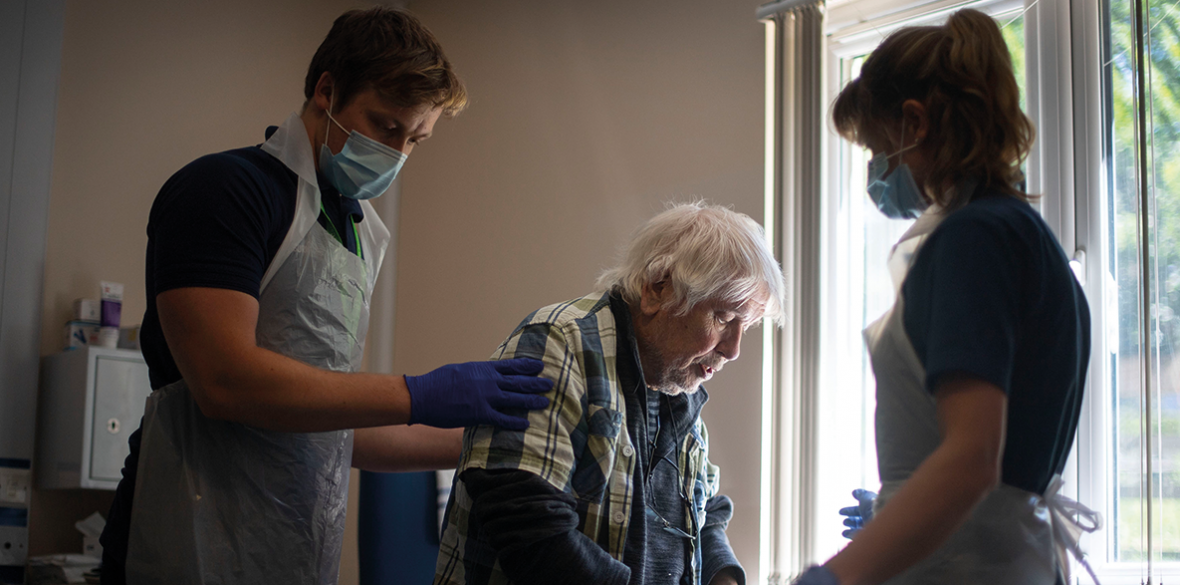This is the last article you can read this month
You can read more article this month
You can read more articles this month
Sorry your limit is up for this month
Reset on:
Please help support the Morning Star by subscribing here
IN OCTOBER 2020 the government promised the House of Lords that an independent report into the ending of free movement and the social care workforce would be completed within six months — by the end of May 2021.
Disabled People Against Cuts (DPAC) is very concerned that as yet no plans have even been put in place for this to happen and the end of applications to the EU settlement scheme, which has been fraught with problems due to the pandemic, has now ended.
The social care sector includes a variety of employment options. The vast majority of social care workers work in care and nursing homes, or in domiciliary care where the workers go into disabled and older people’s own homes, for short periods of time to provide social care support.
Another important group of social care workers are employed directly by individual disabled people, either through PAYE or on a self-employed basis, who receive a direct payment to fund their care from a local authority or through continuing healthcare funding.
Most disabled people who require this type of social care have high support needs and require 24-hour input. It is a unique employment relationship affecting a small minority of disabled people, probably no more than 100,000.
To employ personal assistant care workers (PAs), disabled people have to become employers with HMRC, although they remain an individual employer only so are unable to sponsor staff to work in Britain through any of the current pathways — skilled worker, shortage occupation, health and care worker or temporary worker routes which as individual employers they are unable to utilise.
Alternatively they can employ care workers introduced through an agency which provides live-in care support where staff often work on a self-employed basis.
Again disabled people who use these options to employ staff are currently left without any means to employ new, replacement staff outside of the resident workforce.
Having good, quality social care for independent living is literally a life and death situation for disabled people and they must not become collateral damage in pursuit of the removal of freedom of movement.
The inherent dangers this would create for disabled people must be acknowledged and mitigated by urgent action by the government putting in place changes to provide a specific non-sponsored visa route for disabled employers of PAs and live-in social care workers and agencies that provide live-in social care workers.
The government claims it wants to encourage more British workers into the various social care sectors — but this is not a job that just anyone can do.
Last year the same government attempted to recruit British workers to pick fruit and vegetables with abysmal results, ending with plane loads of EU workers flown in to do the picking.
Disabled people, however, have been shown time and time again over the past 18 months that our lives are of little value to the Tories. Will we just be left at home to rot and die without access to social care workers?
As the turn over of staff in social care remains high loss of such future workers will exacerbate the overwhelming pressures that our crumbling social care system already faces.
It is well documented that the social care sector suffers from a massive shortage of skilled staff and that demand far outstrips supply.
Even if some unemployed workers entered the sector we do not think that alone would help solve this shortage particularly in the short term.
After Brexit the GMB union has estimated that, for the social care sector as a whole, the number of vacant posts will be 460,000 — three times as high as now.
While the government has made exceptions for corporations to employ agricultural workers from abroad, absolutely nothing is in place to help direct-payment recipients to continue to be able to employ the most suitable live-in staff in the future.
Supporting disabled people to live independently in the community is comparatively much more cost effective for the taxpayer. The cost of an adult treatment unit placement can be around £12,000 per week, a care home placement for those with a learning disability at an average of £4,500 a week and a hospital bed £2,500 a week.
DPAC is asking for a specific visa route for individual disabled employers to be able to recruit new and replacement staff which would give social care workers a right to come and work here for periods of time while living primarily in their home countries as they do now.
Linda Burnip is co-founder of Disabled People Against Cuts.











